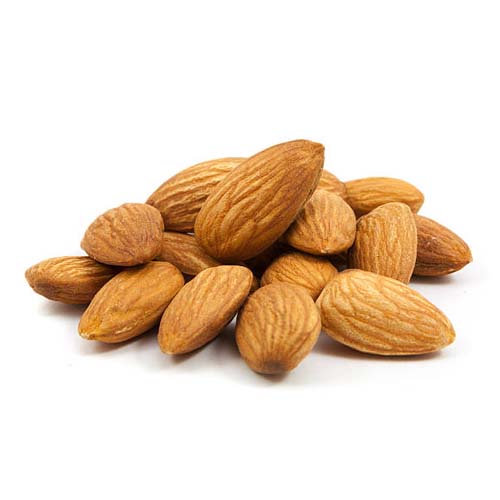
The edible seeds of Prunus dulcis, or just the almond tree, produce almonds, the world's most popular tree nut. They provide a multitude of health benefits by being high in healthy unsaturated fats (particularly the monounsaturated fatty acid oleic acid), protein, vitamins, minerals, and phytochemicals. Almonds and other tree nuts have been associated to better glycemic control, insulin sensitivity, decreased inflammation, and weight loss and maintenance in studies. Daily consumption may help manage risk factors for heart disease, including as cholesterol levels.
Almonds are tasty nuts that can be used in a variety of cuisines as well as enjoyed as a standalone snack. Almonds are considered brain food for children and play an important part in their development.
Almonds are thought to be good for kid's brains and are used in traditional sweets like mithai in India. Almonds are also a popular gift during festivals.
A popular travel treat that provides protein, fibre, and micronutrients including vitamin E and iron, as well as an instant energy booster.
Almonds are important in today society since many of us have started to include them in our diets because of their health benefits. Almonds have a long and distinguished history dating back thousands of years. Almonds grew wild in Western and Central Asia and were likely foraged by our forefathers until being domesticated circa 4000BC, when they were grown and became a popular snack across Asia. From 600 to 900 AD, travellers crossing the 'Silk Road' between Asia and the Mediterranean benefited from the nutritional benefits of almonds, leaving uneaten kernels over Italy and Spain and spreading almond cultivation worldwide.

The first almond plantations in California were established in the mid-1700s, but these trees did not thrive in their new environment. It took another 100 years to produce an almond cross-breed that adapted in the drier Californian climate.
Almonds have become increasingly popular in a variety of dishes. This nut is favorite choice for vegans, as almonds are now used in variety of non-dairy alternatives such as milk, yoghurt, cheese, and even chocolate.
Making almond butter is a fantastic way to consume almonds. All you'll need to do is roast and grind 3-4 cups of roasted almonds. Blend them together until they form a coarse paste. You may make almond-peanut butter by adding some peanuts to it. Your nutrient dense almond butter is ready to use.
If you like shakes or smoothies, you may either mix the almonds to make a paste and then add it to your drink, or simply sprinkle crushed almonds on top.
A handful of almonds whether plain, roasted or salted can keep you full for long hours.
Crush a few almonds and add to your cakes and muffins and even cookies for some extra benefits and nutty flavour.
Vegans can make almond milk which can be used to make tea, yogurt and many other recipes.
Or simply soak few almonds overnight and consume on empty stomach more nutrition. Do not forget to peel off the skin.
Almonds are claimed to assist the human body in a variety of ways, from improving brain powder to keeping diabetes under control.
Almonds contain enough fat to support this function and increase fat-soluble vitamins A and D absorption. Nutrient extraction and cholesterol production are both aided by the nutritious elements found in almonds.
When compared to eating savoury crackers with the same amount of energy, snacking on almonds may reduce appetite between meals.
Almonds are helpful for your skin's general health. They aid in the improvement of skin tone. Almonds may also help to prevent hair loss and premature greying.
They increase the number of good bacteria in your system, which helps to prevent illnesses and nutritional deficiencies.
Almonds is rich in vitamin E that is a natural antioxidant that can help control cancer-causing free radicals. Many studies have found a link between the consumption of almonds and other nuts and a lower risk of cancer in the colon, prostate, and breasts.
All Copyright © 2024 Saturn Worldwide Impex